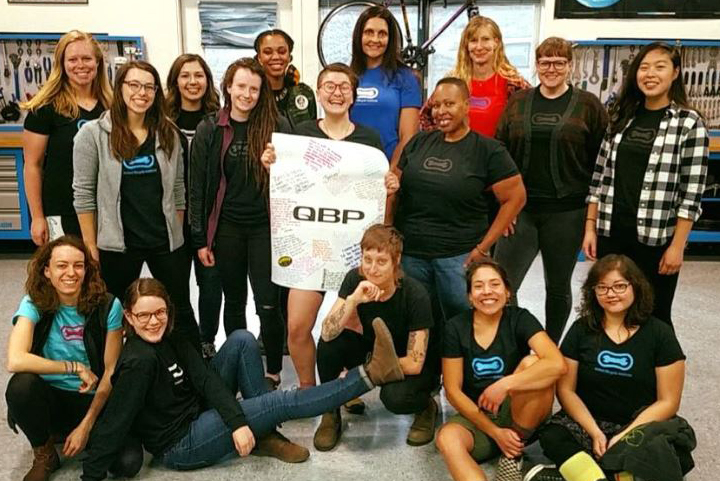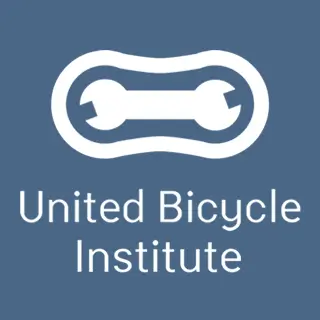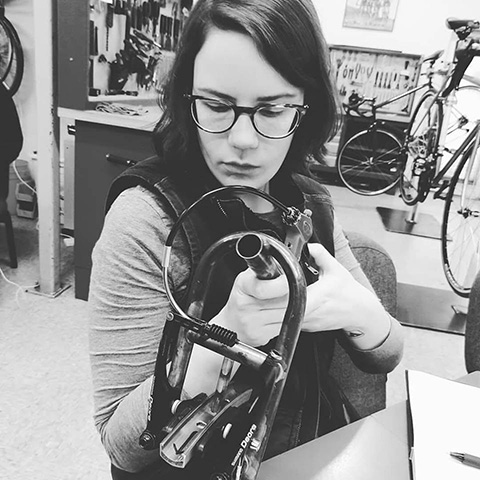Outside of class, you could tell that there was some real passion simmering just below the surface and she is a mover and a shaker. Fairly soon after her class ended, Sorrell was able to secure a job wrenching and spreading the information during her clinic nights. Her interview answers led themselves, so I’ll get out of your way and let you really hear it from Kerri:
 Two years ago, I started volunteering at the Des Moines Bicycle Collective, a nonprofit DIY shop in Des Moines — fixing up bikes, mostly. The shop was very male dominated, and I hardly ever saw women coming in to wrench or ask questions. At one point, one of the mechanics told me that I was the first woman to come in and work on her own bike in months. I’m sure that was exaggerated, but it got me thinking: What about this space needs to change in order for women to feel comfortable here?
Two years ago, I started volunteering at the Des Moines Bicycle Collective, a nonprofit DIY shop in Des Moines — fixing up bikes, mostly. The shop was very male dominated, and I hardly ever saw women coming in to wrench or ask questions. At one point, one of the mechanics told me that I was the first woman to come in and work on her own bike in months. I’m sure that was exaggerated, but it got me thinking: What about this space needs to change in order for women to feel comfortable here?
So I talked to the manager, executive director, a board member, and proposed a women’s program; one that would focus on making the shop more welcoming and break down barriers that women have to wrenching and to cycling. We’ve been doing Women Rolling Collectively for awhile now, a series of shop nights and educational discussions and events, and it’s already made such a difference. I mean wow, I might just start crying typing this…
Shop nights (a free night for women to come to the shop and work on their bikes or learn new skills or drink whiskey or hang out with other awesome women or all of the above) had been going really well, but my wrenching knowledge was limited to the basics. Often, one of the male mechanics would stick around to help, which was great, but I wanted to be able to answer questions on my own so that it could truly be a female-only space.
And I had dreams of building up other female-identifying mechanics, and I needed more training to make that a reality (fun fact: there was only one female mechanic employed in all of Des Moines at that time. Yiiiiikes). So I applied, knowing that if I was accepted, I wanted to pass on knowledge to others and continue to work on making the whole of the Des Moines biking climate more accessible and comfortable for women.
Fast forward to last fall, when the scholarship came open again. One of my friends had sent me a link to the scholarship in 2016, but I was just getting my mechanical chops and didn’t feel qualified enough to apply. But I knew instantly, “Damn, I wanna do that!”, so I set a Google Alert (nerd alert) to catch it when/if it came around again. 2017 was my first year applying.
I went into the scholarship thinking “maybe I’ll run a nonprofit down the line, maybe I’ll own my own shop, who knows?” Hearing other people’s dreams for their bike futures really helped draw parallels to what other cities are doing and what I could do in the future. I think the class taught me that there is a lot, I mean just an endless amount of things I don’t know, and so it helped me realize the steps I needed to take to reach my goals, whether it’s building up a pack of female mechanics in Des Moines or someday opening my own thing. I think it gave me the confidence to know that if I have a vision for a city’s biking future, I have the credibility and support to make it happen down the road.
“It planted my heart squarely in the world of bikes and has allowed me
to dream a lot bigger than I was, definitely.”
I could never fully express how wonderful each and every one of my classmates were and frankly trying would be fruitless because they keep getting cooler and who can keep up with that? This scholarship is so important because spaces and experiences built specifically for female-identifying folx are just different. Every day we’d go in and learn and work with our hands, and people are literally cheering other people on. You can’t just create that sort of environment — it happens naturally when other people understand and identify with your experiences and know the value that this knowledge is adding to your life, confidence, community, etc. I felt such a “We’re-in-this-together-and-we’re-mf’ing-rocking-it” spirit the whole time, whether we were doing a tricky fix or studying together at night (or trying to fit all of our food into one refrigerator). I will always, always, always be grateful for that.
The UBI class is intense, I mean like nothing I’ve ever done before, so to try to pinpoint ONE helpful thing I learned is almost insane because every day I was just awash with new, helpful, amazing knowledge that fried my brain from happiness. I will say, the focus on professional service and creating definable service standards really changed my idea of what a bike shop can be — it’s not primarily a space to sell bikes and talk about cool parts or work at your bench, it’s a space to create relationships and share your passions and give people their dreams, all while being a real badass at your craft. Throughout the course, the attention to detail and focus on creating the best product for a customer really hit home for me.
One of the coolest things about the experience that doesn’t happen for other UBI classes, is the interaction we got with professional females actively working to make the industry more inclusive. From Sara Jarrell of SRAM sharing her experiences, to watching B wrench like a warrior in front of us, to eating lunch with Denise and hearing her passion for bringing women to these classes, it was a constant reminder that there are women moving the industry forward, and they’re unapologetically good at what they do.
“To see that, to see examples of success and women building other women up —
it was powerful, and a guide light for the future.”
My biggest advice to future applicants is to have an idea of what you’d do with the knowledge if you got it. Nobody in my class was there to just learn the stuff and then be awesome — everyone had a vision for how they could better their communities and spaces with the opportunity. Get to know the climate of your city, of your bike scene and start to understand what it needs and how you can be a solution. Super happy to report that after the scholarship, I’m now an employed bike mechanic! I’m working part time at the Collective, fixing up bikes and teaching customers professionally. Right off the bat, my scholarship experience was unique because I was the only one not employed doing a bike-related thing. Now I’m using the skills I learned to teach other women and people who need a confidence boost with their bike. It feels awesome.
I will forever be grateful for the chance to learn in such an amazing space with folx who are changing their communities and the industry. To be surrounded by that energy has been one of the best, most inspiring, most true things I’ve been part of. UBI and QBP get it — they understand that these experiences are necessary and are pushing the bike world forward. You can’t quantify the value of that. Women need to know that they belong and are heard and valued. This experience went beyond that, and provided a platform to make the vision of a better industry and bike world within reach.
“Who knew two weeks could change so much.”
You can read more about Sorrell and her work with the Des Moines Bicycle Collective @ https://www.dsmstreetcollective.org/

